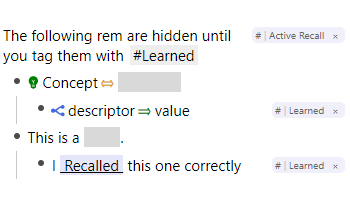What is this?
A Rem Cluster is a small group (a single digit number) of rems that represent a complex concept. The SRS algorithm schedules all the rems in that rem cluster together and in the same order they appear in the document
Why is this needed?
I agree with the fact that it is better to review flashcards in random order. However, I think the most overlooked aspect of this randomization is ‘at what level of detail should we randomize’. If we take the case of rote memorization of vocabulary cards, it totally makes sense to randomize flashcards corresponding to different words. On the other hand, if we take complex concepts from any field that need understanding (as opposed to rote memorization) often we need multiple flashcards to completely represent that concept. If I use my learning approach as an example, I just ask few questions about a complex concept to enforce my understanding about it. In that case, if these flashcards are asked in random order during review it may not be ideal to get the correct full picture. The worse part is when these cards mature. As we do more reviews the cards mature and the interval between reviews increase. These related flashcards (or questions in my case) may end up in a state in which I get one related flash card today and another related flash card two weeks later. Thus without a proper order, spaced repetition systems fragment the the concept and fail to help us in understanding the full picture. If you are serious about learning, you probably know that this is one of the biggest draw back of SRS ( Read more A vote against spaced repetition - Flashcards are less useful to learning the “big picture”)
Related Topics
- Studying RemNote in Chronological Order
- How can I see flashcards in order? From first rem to last rem?
- Hello. How do I get cards in order in the queue?
- How can I see flashcards in order?(from 1st topic of a chapter to last topic)
- Practicing rems : why is it so unorganized ?
Implementation
The implementation can be as simple as introducing a Power-Up rem that can be applied to a parent. Parent tagged with this particular Power-Up will treat its children (only children, not descendants) as a Rem Cluster
What can go wrong with this idea?
-
Won’t this prevent reviews from getting scheduled uniformly over time?
I think if you use it correctly it won’t create a big imbalance. The idea is to create a small group (I prefer a group of not more than 5 rems). Above all, you are not doing more number of reviews, it is just that the reviews are grouped logically -
What if I forget one card from a cluster?
Ideally there should be a setting so that the user can decide what to do when this happens. One option is to consider the whole cluster as forgotten, but that is not ideal. Another smarter option would be to take into account the next repetition time of the cluster and schedule reviews for the forgotten card in such a way that by the time the cluster gets reviewed next time, you would remember the forgotten card. - What else ? any thoughts/feedbacks ?




 Active Recall
Active Recall